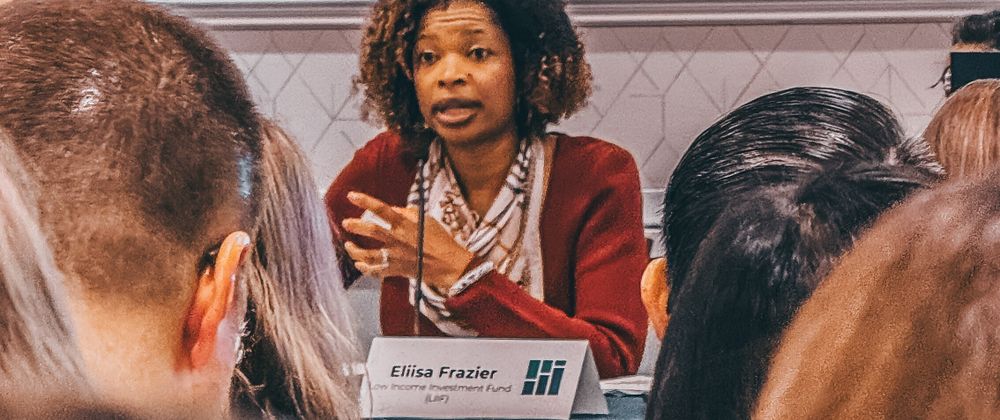By Casey Ariel Dike’, Founder & CEO of Blaze Group, Contractor for the Interledger Foundation
At the 41st Annual Opportunity Finance Network (OFN) Conference in Washington, D.C., more than 2,300 attendees gathered to explore how Community Development Financial Institutions (CDFIs) can continue driving equitable access to capital amid significant shifts in the financial landscape.
One session in particular, called “Reframing Risk in Rural Investments,” offered lessons that resonated across the room.
Panelist Andrew Crosson, CEO of Invest Appalachia, reminded us that building trust in rural finance starts with language and listening. He encouraged practitioners to “turn headlines into backyard conversations,” grounding discussions in the priorities of the people we intend to serve rather than the buzzwords that dominate mainstream narratives.
He gave a compelling example: people respond more openly to “These solar panels can save you money this year,” _than to _“The effects of global warming will…” The first speaks to a person’s daily reality; the second, to a topic that can feel polarizing.
Then, with a smile, Crosson recalled a borrower who, after one such conversation, laughed and said, “All God’s children like to save money.”
The entire audience chuckled in recognition. We all saw our grandparents, cousins, and neighbors in that story. The moment underscored a universal truth: trust is built by meeting people where they are, not by asking them to step outside of it.
Throughout the conference, the Appalachian region emerged as a grounding metaphor for what’s required of community finance leaders today. Across sessions, speakers reinforced a central insight: capital moves only at the speed of trust.
While many conversations in financial inclusion lean digital — especially in fintech — this session reminded us of something critical: not everyone lives in a cashless society, and not everyone is fluent in digital tools. Across rural regions, far beyond hotspots like Oakland or Boston, practitioners reiterated that trust remains the most valuable form of currency.
I saw much of my own approach reflected in those conversations. In my work, I lead with listening. Every community has its own histories and everyday practices that shape how people relate to money. Those nuances aren’t obstacles, they’re anchors for designing the future. We can’t shift power dynamics toward the people without first understanding their reference points and realities.
I spoke about this at length on a recent episode of the Future|Money (F|M) podcast — hosted by Kokayi Issa and powered by the Interledger Foundation — where we explored what it truly means to shift economic power to communities. The episode is titled “From Big Tech to Community Education: Reimagining How Money Moves.”
At Blaze Group, in partnership with the Interledger Foundation and other global allies, our goal is not to save communities. Our mission is to equip them with the tools to save themselves. From catalytic capital to adaptable technology to accelerator programming, the infrastructure we build must be agile enough to be informed by those who are doing the building.
We’re not here to replicate models that force marginalized communities down pre-set paths. We’re here to empower them to chart their own.
And if that means turning headlines into backyard conversations, then I believe that’s a model worth following.
Through my work with Interledger Foundation, I’m helping bridge Community Development Financial Institutions (CDFIs) and fintech platforms to catalytic funding that supports digital financial inclusion. But the real work begins with trust — and that starts with listening.
For CDFIs, which are America’s first economic responders that are already embedded in historically underbanked communities, the goal isn’t to modernize for modernization’s sake. It’s to build systems that reflect the people they serve.
The OFN Conference was a week well spent. It was full of learning, connecting, and ideating for the world we’re shaping together. One that listens first, builds second, and always starts in the backyard.
About the Author
Casey Ariel Dike’ is the Founder and CEO of Blaze Group®, a finance innovation studio offering tools and frameworks that help overlooked communities own, protect, and scale their economic power. With a background in global corporate banking, Casey now focuses on reshaping capital access through financial education, fintech literacy, and equitable product design. She serves as a Strategic Lead for the Interledger Foundation, expanding their reach across financial institutions, colleges, and fintech communities concentrated in underbanked regions.
LINKS:
- Company Website - blazegroup.io
- Personal Website - iamcaseyariel.com
- Instagram - instagram.com/blazegroup.io
- Company LinkedIn - linkedin.com/company/blazegroup
- Personal LinkedIn - linkedin.com/in/iamcaseyariel






Top comments (0)